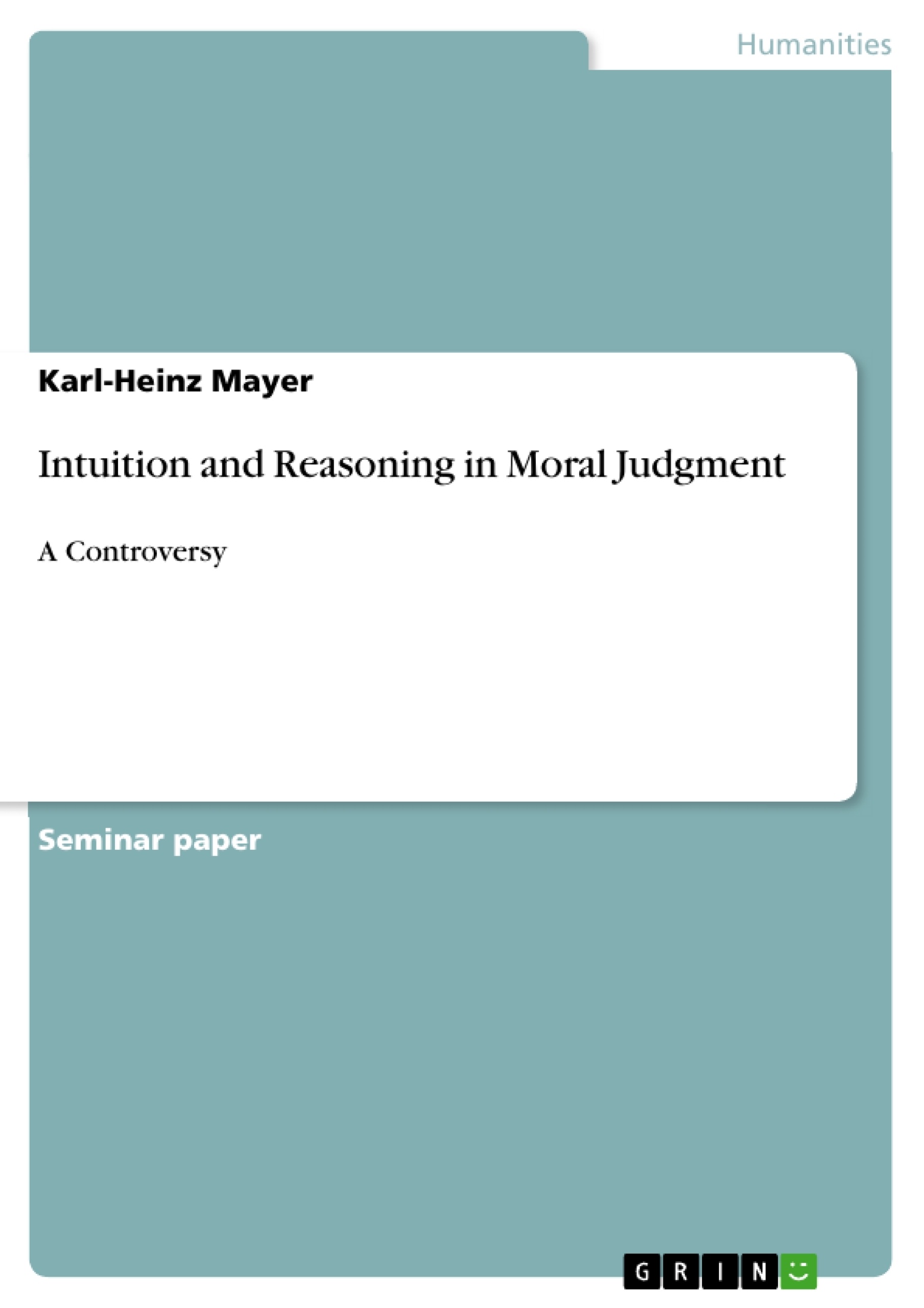This seminar paper is about the balance between intuition and affect on one hand, and conscious reasoning on the other, in moral decisions. The basis for this analysis consists of recent neurobiological and psychological research.
The paper first looks for some input from Neurophysiology to understand what is known about the “wiring” in our brain for moral decisions. Are moral judgments effectuated in the “rational” cortical regions of the brain or in the “intuitive”, affective, and emotional subcortical region?
It then presents a controversy between Jonathan Haidt and Pizarro and Bloom over the predominance of intuition over reasoning in moral judgment. Jonathan Haidt proposes a theory called Social Intuitionist Approach that postulates a priority of intuition over reason, combined with a social component. Moral decisions are predominantly intuitive, he argues, and reason is primarily used to justify the decision afterwards.
Pizarro and Bloom are not fully convinced. While they agree with some parts of Haidt’s theory, they contradict his overall conclusion about the dominance of intuition over reason. In their opinion there is sufficient room for training one’s intuitions and for rationally preparing moral decisions.
Haidt counters the counter-arguments, but concedes that statistical data are missing, which would allow a final assessment of the matter.
Table of Contents
- Introduction.
- The Neurophysiology of Moral Judgment.
- The Social Intuitionist Approach to Moral Judgment.
- A pertinent controversy.....
- Objections to Haidt (2001) by Pizarro and Bloom...........
- Cognitive Appraisal .......
- Control over the input......
- Reply by Jonathan Haidt to the objections by Pizarro and Bloom
- Evaluation of the arguments .........
- Philosophical Aspects of the dilemma discussed....
- Conclusion.....
- References
Objectives and Key Themes
This paper examines the role of intuition and conscious reasoning in moral decision-making, drawing on recent neurobiological and psychological research. It analyzes the interplay between these two processes and explores the potential dominance of one over the other.- The neurobiological basis of moral judgment, particularly the involvement of cortical and subcortical regions.
- The Social Intuitionist Approach, which proposes that moral judgments are primarily intuitive and that reasoning is used for post-decision justification.
- The controversy surrounding the prominence of intuition over reasoning in moral judgments, focusing on the objections raised by Pizarro and Bloom against Haidt's theory.
- The potential for training moral intuitions and the role of rational preparation in moral decision-making.
- Philosophical considerations regarding the debate between intuition and reasoning in moral judgments.
Chapter Summaries
- The introduction sets the stage for the paper, highlighting the interplay between intuition and reasoning in moral decisions and outlining the structure of the analysis.
- Chapter 2 delves into the neurophysiological underpinnings of moral judgment, presenting recent research that challenges the traditional view of conscious reasoning as the primary driver of moral decisions. It explores evidence suggesting that moral judgments are often intuitive and driven by affective responses, highlighting the role of cortical and subcortical regions in the decision-making process.
- Chapter 3 introduces the Social Intuitionist Approach, a theory proposed by Jonathan Haidt that posits the primacy of intuition in moral judgments. Haidt argues that moral decisions are primarily intuitive, and reasoning is employed primarily for ex post justification.
- Chapter 4 delves into a controversy surrounding the dominance of intuition over reasoning in moral judgments. Pizarro and Bloom raise objections to Haidt's theory, arguing that there is sufficient room for training moral intuitions and for rationally preparing moral decisions. Haidt counters these objections but acknowledges the need for further research to definitively assess the issue.
Keywords
The central focus of this paper lies on the dynamics between intuition and reasoning in moral judgments, drawing upon neurobiological and psychological research. Key topics include the neurophysiological basis of moral decisions, the Social Intuitionist Approach, the debate between intuition and reasoning, and the implications for moral development and decision-making.- Citar trabajo
- Dkfm., BA Karl-Heinz Mayer (Autor), 2014, Intuition and Reasoning in Moral Judgment, Múnich, GRIN Verlag, https://www.grin.com/document/273346



